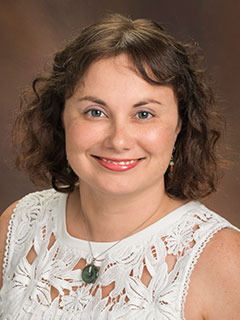HOW CAN WE HELP YOU? Call 1-800-TRY-CHOP
In This Section
Research Podcast, RWJF Award, Fetal Hemoglobin, CPAP Use

By limjr [at] chop.edu (Jillian Rose Lim)
A podcast, a paper, and an award to be proud of are featured this week in Children's Hospital of Philadelphia research news. We share something new for your audio playlist called Bench to Bedside, highlight new findings related to fetal hemoglobin as well as an improved approach to continuous positive airway pressure, and congratulate a neurology researcher on a highly impactful award.

Sue Furth, MD, PhD
Tune in to Dr. Sue Furth's New Podcast
Staying connected with the Research Institute's hot topics and happenings just got a little easier with the new Bench to Bedside podcast featuring host Sue Furth, MD, PhD, chief scientific officer at CHOP. In the podcast, Dr. Furth explores the ingenuity of our faculty and staff and discovers how they make achievements in science possible. The first episode features Howard Eck, director of Research Resources and a pillar of knowledge about how to set our labs up for success. Drawing on his decades-long career at CHOP, Eck shares how the Research Institute has changed over the years and where it's headed, including the construction of new buildings that will provide even more bench space for scientists.
Listen to Ep. 1 of Bench to Bedside.

Ana Cristancho, MD, PhD
Dr. Cristancho Awarded Robert Wood Johnson Foundation Award
Join us in congratulating Ana Cristancho, MD, PhD, child neurologist and assistant professor in the Department of Neurology at CHOP, for her receipt of the Robert Wood Johnson Foundation (RWJF) Harold Amos Medical Faculty Development Program (AMFDP) Award! The award program honors Harold Amos, PhD, the first African-American to chair a department of Harvard Medical School and was created to increase the number of faculty from historically disadvantaged backgrounds who can achieve senior rank in academic medicine, dentistry, or nursing. As many as 10 four-year postdoctoral research awards are offered each year to historically disadvantaged individuals in these fields "who are committed to developing careers in academic medicine and to serving as role models for students and faculty of similar background," according to the RWJF website.
Award recipients receive an annual stipend up to $75,000 complemented by a $30,000 annual grant toward support of research activities. Dr. Cristancho's research focuses on better understanding the mechanisms that regulate the extent of disabilities some children may have after prenatal and neonatal brain injury with the goal of advancing the development of novel therapeutic interventions.
Learn more about the Amos Medical Faculty Development Program.

Gerd Blobel, MD, PhD
Researchers Refine Understanding of Fetal Hemoglobin Regulation
In a new study published in CHOP researchers in the lab of Gerd Blobel, MD, PhD, described their discovery of a new part of the regulatory cascade responsible for silencing fetal hemoglobin in adult cells. If researchers can better understand how the body turns fetal hemoglobin "off" and adult hemoglobin "on" after birth, they can use this knowledge to develop novel therapies for blood disorders like sickle cell disease or beta thalassemia.
Prior research identified that the BCL11A gene is not expressed in fetal red cell precursors and is turned on only in adult type red blood cells. But how transcriptional regulation of the BCL11A gene occurred was largely unknown. In their new study, researchers led by Peng Huang, PhD, research associate in the Blobel Lab, demonstrated that the developmental regulation of the BCL11A gene occurs predominantly at the transcriptional level, and that the transcriptional repressor HIC2, which is expressed in the fetal stage, represses BCL11A transcription in fetal cells. Fittingly, overexpression of HIC2 increased the production of fetal hemoglobin.
"Our study uncovered HIC2 as a key regulator of the fetal-to-adult hemoglobin transition," said senior study author Gerd A. Blobel, MD, PhD, investigator and holder of the Frank E. Weise III Endowed Chair in Pediatric Hematology at CHOP. "Although it is likely that additional fetal stage-specific genes are involved in maintaining the cells in a fetal state, this study provides important insights into the silencing of fetal hemoglobin, which could potentially be targeted in future therapies."
Researchers Develop Interdisciplinary Approach to Improve CPAP Use for Sleep Apnea
Though continuous positive airway pressure (CPAP) is a helpful treatment for children with obstructive sleep apnea, some challenges can hinder successful treatment. In a new study published in Pediatric Pulmonology, CHOP researchers demonstrated how an improved approach to outpatient CPAP care and processes involving a tracking system and standardizing interdisciplinary care, could be an effective intervention. The finding results from an interdisciplinary quality improvement initiative that involved physicians, nurses, psychologists, and respiratory therapists. Their goal was to increase the number of patients attending follow-up visits, reduce the median time to first follow-up visit to less than four months, and increase the proportion of patients obtaining a post-initiation polysomnogram (a test used in sleep studies) within one year to more than 50 percent.
The new approach proved successful: The proportion of patients returning to the clinic within four months increased from 38.2% to 65.5%, the median time to the first follow-up visit improved from 133 days to 56 days, while more than 70% of patients returned for a post-initiation polysomnogram. The researchers also found significant reductions in the length of stay for emergency department visits and hospital stays in a subsample of patients compared to before the patients began CPAP treatment.
ICYMI
Catch up on our headlines from our August 5 In the News:
- PolicyLab Releases 2022 Impact Report
- FDA Approves Drug for Rare Cancer
- CHOP Hosts Town Hall for PRESERVE Project
- Penn/CHOP Study Finds Newly Formed 'Immature' Neurons Appear in Brain Throughout Life
- Daycare Linked to Increased Complications in Preterm Children with Chronic Lung Disease
Keep up with our news, stories, and updates in real time by following us on Twitter, Facebook, LinkedIn, or Instagram. Stay connected with Research Institute happenings with the new Bench to Bedside podcast. Or subscribe to our newsletter to get an email sent every other Friday by signing up here.


